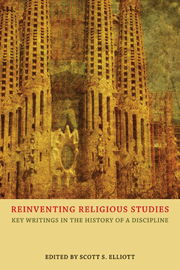Book contents
- Frontmatter
- Contents
- Introduction
- 1 For such a time as this: the Council of Societies for the Study of Religion, 1969–2009
- Part I Inventing and reinventing the field of religious studies
- Part II Method and theory in religious studies
- Part III Teaching religion
- Part IV Women and the bible in religious studies
- Part V Religion and religious studies in civic life
- Part VI Religious studies and identity politics
- Part VII Islam and 9/11
- 37 On the teaching of Islam in America
- 38 Reflections on teaching about September 11
- 39 Death and memory at Ground Zero: a historian of religion's report
- 40 September 11, 2001 and Islam
- Bibliography
- Acknowledgments
- Index
40 - September 11, 2001 and Islam
from Part VII - Islam and 9/11
- Frontmatter
- Contents
- Introduction
- 1 For such a time as this: the Council of Societies for the Study of Religion, 1969–2009
- Part I Inventing and reinventing the field of religious studies
- Part II Method and theory in religious studies
- Part III Teaching religion
- Part IV Women and the bible in religious studies
- Part V Religion and religious studies in civic life
- Part VI Religious studies and identity politics
- Part VII Islam and 9/11
- 37 On the teaching of Islam in America
- 38 Reflections on teaching about September 11
- 39 Death and memory at Ground Zero: a historian of religion's report
- 40 September 11, 2001 and Islam
- Bibliography
- Acknowledgments
- Index
Summary
Ten centuries ago, the celebrated Persian poet Nasir Khusraw lamented the Islam he saw around him as one characterized by literalism and legalism, even as he made a case for enlightening the understanding of one's faith through investigation, analysis and informed praxis. As we reflect on the terrible tragedy of 9/11, those of us who are Muslims, and those of us who study Islam in the Academy may be struck by the double bind in which we find ourselves.
On the one hand, engaging the question, “Why would they hate us so much so as to instigate such a senseless, tragic act?” raises doubts about our patriotic spirit at the same time as it illuminates the consequences of our, and might I add, European foreign policy during the last 150 years.
On the other hand, even as we rise to defend Islam and Muslims against mandating and undertaking such a heinous assault on innocent human lives through a hermeneutic that distances the perpetrators from Ordinary Muslims and affirms the close affinity Islam has with Judaism and Christianity, we are forced to admit that, yes, the pilots and their accomplices were card-carrying Muslims, yes, they looked to their own understanding of Islam to fortify their spirits prior to their acts, and yes, a legalistic and literalistic interpretation of Islam has come to the forefront of public discourse in recent decades and evidence of this is to be found globally wherever there are conflicts involving Muslims.
- Type
- Chapter
- Information
- Reinventing Religious StudiesKey Writings in the History of a Discipline, pp. 249 - 252Publisher: Acumen PublishingPrint publication year: 2013

